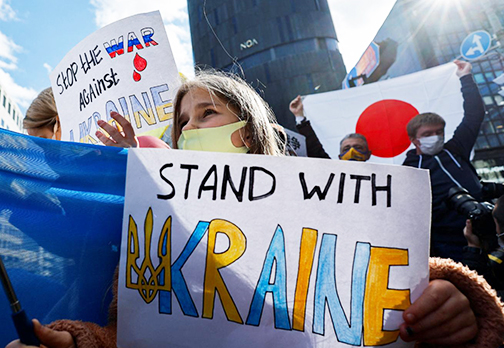
A Ukrainian residing in Japan shows a placard during a protest rally denouncing Russia over its actions in Ukraine, near the Russian Embassy in Tokyo Feb. 23, 2022. Pope Francis expressed “great sorrow” over the situation in Ukraine and called on Christians to observe a day of prayer and fasting for peace on Ash Wednesday, March 2. (CNS photo/Issei Kato, Reuters)
~ by Cindy Wooden, Catholic News Service
VATICAN CITY – Pope Francis knows his appeals for an end to the war in Ukraine carry little weight with Russian President Vladimir Putin, but he also knows he has an obligation to continue speaking out and rallying others to join him in praying for peace.
In April 2021 – 10 months before Putin invaded Ukraine – the Pope expressed his concerns about a buildup of Russian troops on the Ukrainian border and an escalation in the fighting between Ukrainian and Russian-backed separatists in Easter Ukraine.
He did the same in December, in January and repeatedly in February as it seemed Putin was serious about launching an offensive.
Emphasizing the seriousness of his concern, Pope Francis did not summon the Russian ambassador to the Holy See, but instead went in person to the embassy on February 25.
One week before Putin launched the invasion, Pope Francis told members of the Congregation for Eastern Churches – including Eastern Catholic leaders from Ukraine, Iraq, Syria and Ethiopia – that too often “the warnings of both popes and men and women of goodwill are unheard.”
Humanity, he said, seems to have “an attachment to war, and this is tragic.”
Still, Pope Francis noted, modern popes, beginning with Pope Benedict XV before World War I, have tried to appeal to consciences and to warn of the “useless slaughter” and the unforeseen consequences of going to war.
Papal appeals for peace and dialogue always look first to the impact violence and war will have on civilians, especially the elderly and children. In military calculations, they are “collateral damage,” but as Pope Francis noted on February 27, they are always the first victims of conflict.
The most thorough papal examination of the folly of war to date is “Pacem in Terris,” published in 1963 by Pope St. John XXIII.
In June, the Vatican publishing house released “Peace on Earth: Fraternity is Possible,” a collection of Pope Francis’ words and speeches on the importance of praying and working for peace.
“We can no longer think of war as a solution because its risks will probably always be greater than its supposes benefits, one of the main criteria of just-war theory, he wrote in the document. “In view of this, it is very difficult nowadays to invoke the rational criteria elaborated in earlier centuries to speak of the possibility of a ‘just war.’ Never again war!
To read the full article, please click here
